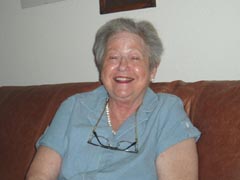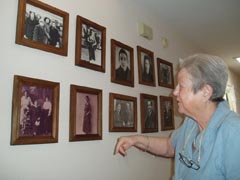During WW II the Jews in Europe experienced the horrors of genocide and the anti-Semitic policy of Hitler. It has been 63 years since May 9th and the end of WWII but the horror of Hitler’s genocide and anti-Semitic policy still lives in books, films and in the memory of many people.
There is a story about the salvation of Bulgaria’s Jews during World War II, which is well known and documented among Bulgarians and Jews. The heroic act was a result of a complicated political game of King Boris III and the Bulgarian government at that time; they took into consideration the public opinion of saving the Bulgarian Jews from the death camps. In the story “Beyond Hitler’s Grasp”, Machael Bar-Zohar is confirming “this heroic rescue of Bulgarian Jews”. According to the author, King Boris III, along with other politician Dimitar Peshev and the metropolitan Stefan of the Bulgarian church, delayed action on deporting Jews from Bulgaria long enough before the war to turn against the Nazis. In fact Bulgarian Jews were the only Jewish population in Europe during WW II to actually increase at that time. Nowadays there are many strong Jewish communities around the world. They proudly treasure their ideals, customs and traditions, while passing them on to future generations. What always amazes me is the unity among the Jews, which explains their surviving throughout a history of great aggression against the Jews.
Have you ever been to a Jewish celebration? Anything – wedding, Bar-Mitzvah, Hanukkah? At Jewish gatherings everybody’s dancing and laughing; they’re hugging and kissing each other, while still respecting the traditional symbols and customs! It seems to me that they really mastered the art of seizing the moment and the ability to celebrate life in its ordinary aspects.
We met with Dolly, a true Jewish woman, days before Passover. Her life story reflects the common destiny of many other Jews.
Q. I heard that you are a survivor of Auschwitz, Dolly. Please, tell me about you and your life.
A. I was born in Galicia, in a wealthy, industrial business, family and I was raised in happiness till age of nine, when the nightmare began…
The following five years took away from her parents, home and good health along with her security, childhood and peace. She went through a concentration camp and the ghetto, surviving mainly because of the help of her older sister. When Dolly was 16, she and her sister were freed but the horror of the cremations (her reference to the concentration camp) follows till today. Throughout her younger years, she stayed a year in Prague, eleven years in England, and seven years in Canada. On May 18, 1957 she married Aron and shortly after that they came to the U.S.A.
Q. That is quite a traveled life. It is obvious what period was the most difficult and tragic for you, but what would you qualify as the best time of your life?
A. The best time? The years after the concentration camp, of course. The sense of having a chance to live again cannot be put into words. Yes, this was the time I felt best, but as a result of what I went through in the concentration camp, I developed a terrible disease, which was in its worse stage right after I got married. Thanks God I have such an angel for a husband. I wouldn’t make it until today without him.
I looked carefully at Aron during the lunch time we had in their house. Despite the age and what they went through, he obviously preserved a great deal of youth attitude toward life. His positive input in all the subjects we touched during our time together, gave me the sense of good energy and clear spirit. There was so much affection every time he talks with his wife or his daughter, who happen to call at that time to share with them about her coming interview on CNN in June.
Q. How long have you been married? (I had needed to confirm my math.)
A. We met in London and married in 1957… Fifty-one years – somehow shyly answers Dolly - Oh I love him as I loved him at the begging of our journey together. No, actually I love him more and more with each passing day.
Q. What part in your life would you say is determined by the Jewish ethnic requirements?
A. Well, I tried to pass our customs and traditions to my two daughters, but did not ever push them to stick only to them. They are individuals and have the freedom to choose. As a result one of my daughters is a Rabbi, while the other practices Christianity.
Q. A few days from now is Passover. (We met shortly before the holiday.) Are you going to the church? In other words, how do “non-strict Jews” as you, celebrate Passover and other similar holidays?
A. Of course we are going to the synagogue, but we do not do this every day. A church is the community center for us, it’s not the ONLY place we can practice our beliefs, or to communicate with God.
Q. What is the most precious value in the Jewish culture for you? Especially on Passover?
A. I like the fact that everything – food, different objects, actions, words… everything has its own meaning that comes through centuries and this way I am connected with my ancestors. It reflects a bit of our history and how we were freed. It reveals the process from slavery to freedom.
Most of all I love the fact that the whole family is at the same time at home. It is so festive! We replace everything in the house for the occasions: dishes, table clothes, glassware and so on, which enhance the festive atmosphere.
Q. Is there a role-model in your life?
A. My husband is the light of my life, but the other person I measure everything with is my father, my hero. It still hurts to recall the time when the Germans took him away and because of the scarlet fever I had, I couldn’t say good bye and see him for the last time. He was one of the most extraordinary people in my life and I tried to follow in his footsteps.
Q. Have you ever went back, I mean physically, to the places of the past?
A. Five years ago. In my home town… I saw the school I attended… Nothing was left from our beautiful house! The only thing remaining was the chestnut tree that my family planted.
Painful memories squeezed her voice. It was time to change the subject. To end the conversation.
Q. What keeps you busy nowadays?
A. I am writing a book. The working title is “My Life”. I do not want to be forgotten. I want to reveal what humans are doing to other humans.
Other activities of mine are the arrangements of my traditional gifts for different occasions. I plant a tree in the National Forest in Israel for EVERY SPECIAL opportunity!
What a great idea! I was astonished by the beauty of everything she was saying and the things she’s doing. Spontaneously I wanted to greet her with… Shalom. SHALOM in my life Dolly. Shalom and Welcome in our culture throughout the Bulgarian Horizon newspaper.
Daphne Karcheva-Orris

Dolly, a true Jewish woman

Dolly and her Memorable Photoes
